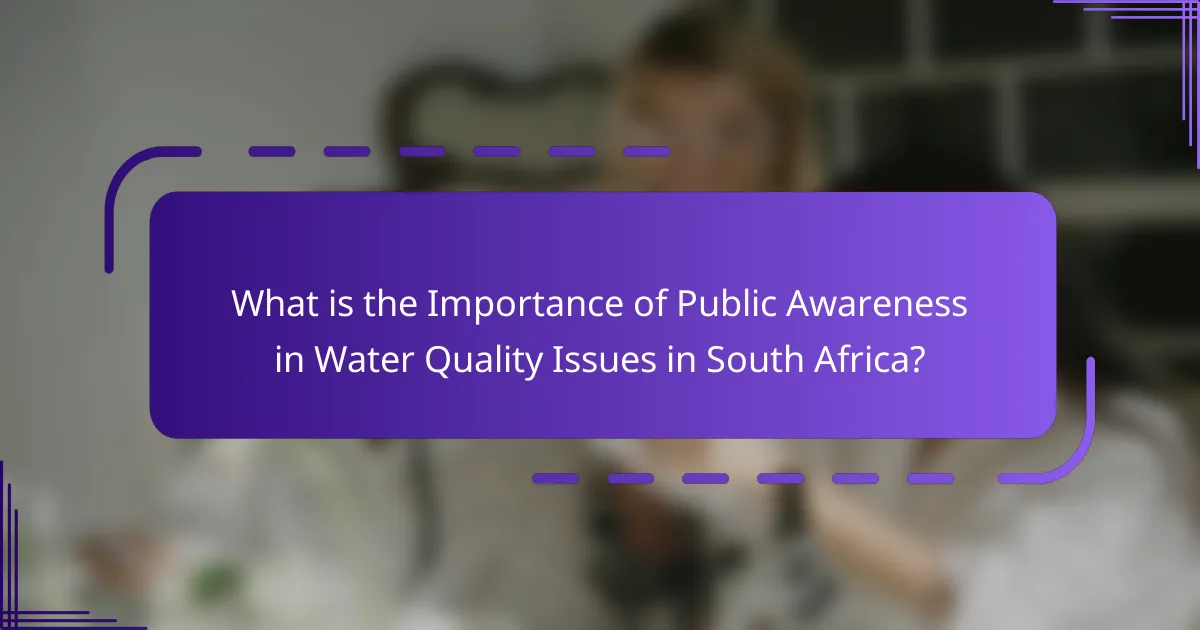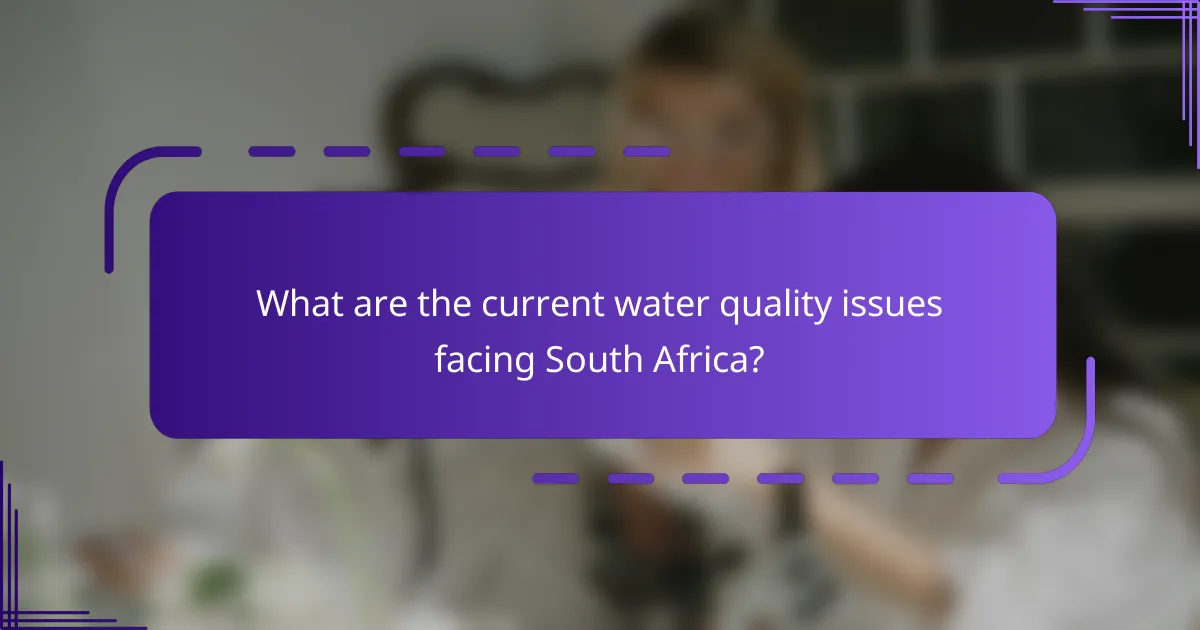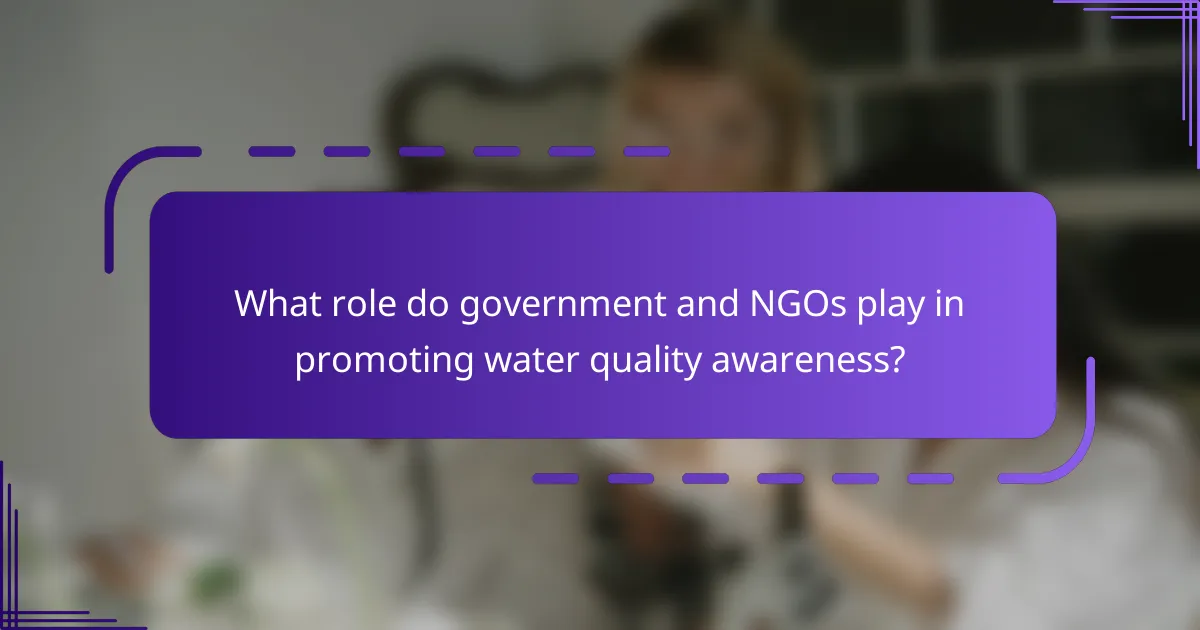Public awareness is essential for addressing water quality issues in South Africa, where contamination from agricultural runoff, industrial pollution, and inadequate wastewater treatment poses significant health risks. High levels of nitrates, phosphates, and harmful pathogens in drinking water highlight the urgent need for informed decision-making regarding water use and conservation. Educational programs and public campaigns led by governments and NGOs aim to empower communities, promote advocacy for better water management policies, and enhance understanding of water-related health risks. Collaborative efforts between these entities are crucial for mobilizing action and improving water quality outcomes in a country facing severe water scarcity challenges.

What is the Importance of Public Awareness in Water Quality Issues in South Africa?
Public awareness is crucial for addressing water quality issues in South Africa. It empowers communities to recognize and respond to pollution threats. Increased awareness leads to informed decision-making regarding water use and conservation. Education programs help individuals understand the health implications of contaminated water. Public campaigns can mobilize action for better water management policies. Awareness initiatives can also promote advocacy for government accountability. In South Africa, where water scarcity is a significant concern, public engagement is vital. Effective communication strategies can enhance community resilience against water quality challenges.
Why is public awareness crucial for addressing water quality issues?
Public awareness is crucial for addressing water quality issues because it empowers communities to take action. Informed citizens can advocate for better policies and practices. Awareness leads to increased participation in water management initiatives. It also encourages individuals to adopt sustainable behaviors that protect water sources. Education campaigns can highlight the health risks associated with poor water quality. For example, in South Africa, contaminated water can lead to cholera outbreaks. Statistics show that communities with higher awareness levels report fewer waterborne diseases. Thus, public awareness is a key driver in improving water quality and public health outcomes.
How does public awareness impact community engagement in water quality?
Public awareness significantly enhances community engagement in water quality. Increased awareness leads to greater understanding of water issues. This understanding motivates community members to participate in monitoring and advocacy. For instance, studies show that informed citizens are more likely to attend local meetings on water quality. They also engage in clean-up efforts and support sustainable practices. Furthermore, campaigns that educate the public can lead to policy changes. Research indicates that communities with higher awareness levels often experience improved water management outcomes. Thus, public awareness is crucial for fostering active community involvement in water quality initiatives.
What role does public awareness play in policy-making for water quality?
Public awareness significantly influences policy-making for water quality. It drives community engagement and informs stakeholders about water issues. Increased awareness leads to public demand for better regulations. This demand can prompt governments to prioritize water quality initiatives. In South Africa, campaigns like the Department of Water and Sanitation’s “Water is Life” enhance understanding of water challenges. Educational programs further empower citizens to advocate for clean water policies. Research shows that informed communities are more likely to participate in policy discussions. Therefore, public awareness serves as a catalyst for effective water quality governance.
What are the key components of effective public awareness campaigns?
Effective public awareness campaigns include clear messaging, audience targeting, strategic partnerships, and evaluation methods. Clear messaging ensures that the information is easily understandable and resonates with the audience. Audience targeting allows campaigns to focus on specific demographics that are most affected by water quality issues. Strategic partnerships with local organizations can enhance credibility and expand outreach efforts. Evaluation methods are essential to assess the campaign’s effectiveness and make necessary adjustments. Research shows that campaigns with these components are more successful in raising awareness and prompting action. For instance, a study by the Water Research Commission highlights the importance of tailored messaging in engaging communities in South Africa.
What strategies are used in successful water quality awareness campaigns?
Successful water quality awareness campaigns utilize multiple strategies. These strategies include community engagement, educational programs, and social media outreach. Community engagement fosters local involvement and ownership of water issues. Educational programs provide information on water safety and conservation techniques. Social media outreach amplifies campaign messages to a broader audience. Collaborations with local organizations enhance credibility and reach. Use of visual aids and infographics simplifies complex information for better understanding. Regular assessments of campaign effectiveness guide future improvements. These strategies have been proven effective in raising awareness and promoting action on water quality issues.
How do educational programs enhance public understanding of water quality?
Educational programs enhance public understanding of water quality by providing essential information about its significance and impacts. These programs often include workshops, seminars, and community events. They educate participants on the sources of water pollution and its effects on health and the environment. For example, the Water Research Commission of South Africa has initiatives that focus on local water issues. Studies show that informed communities are more likely to engage in water conservation efforts. Programs also encourage citizen participation in water monitoring activities. This hands-on involvement fosters a deeper connection to local water resources. Ultimately, educational programs empower individuals to make informed decisions regarding water usage and protection.

What are the current water quality issues facing South Africa?
South Africa is currently facing several water quality issues. These include contamination from agricultural runoff, industrial pollution, and inadequate wastewater treatment. High levels of nitrates and phosphates are common in many water sources. This contamination negatively impacts both human health and aquatic ecosystems. Additionally, the presence of harmful pathogens in drinking water is a significant concern. Recent reports indicate that over 30% of the country’s rivers are polluted. The lack of infrastructure and maintenance further exacerbates these issues. Public awareness campaigns are essential to address these challenges effectively.
What specific water quality challenges exist in South African communities?
South African communities face several specific water quality challenges. Contaminated water sources are prevalent due to inadequate sanitation facilities. Many rural areas lack access to clean drinking water. Heavy rainfall often leads to runoff, which carries pollutants into water supplies. Industrial activities contribute to chemical contamination of local water bodies. Aging infrastructure results in leaks and water loss, exacerbating shortages. Waterborne diseases are common due to poor water quality. Studies indicate that approximately 2.2 million South Africans rely on unsafe water sources. These challenges highlight the urgent need for public awareness and effective educational programs.
How do environmental factors contribute to water quality issues?
Environmental factors significantly contribute to water quality issues. Pollution from industrial runoff introduces harmful chemicals into water bodies. Agricultural practices often lead to nutrient runoff, causing algal blooms that deplete oxygen levels. Urbanization increases impervious surfaces, leading to higher stormwater runoff and contaminants. Climate change affects precipitation patterns, altering water availability and quality. Deforestation can lead to soil erosion, increasing sediment in water sources. These factors collectively degrade water quality, impacting ecosystems and human health.
What health risks are associated with poor water quality in South Africa?
Poor water quality in South Africa poses significant health risks. Contaminated water can lead to waterborne diseases such as cholera and typhoid fever. These diseases are caused by pathogens present in unsafe drinking water. According to the World Health Organization, cholera outbreaks in South Africa have been linked to inadequate sanitation and poor water treatment. Additionally, heavy metals and pollutants in water can cause long-term health issues, including kidney damage and developmental problems in children. The South African Department of Water and Sanitation reports that many communities lack access to clean water, increasing the risk of these health issues.
How do campaigns and educational programs address these issues?
Campaigns and educational programs address water quality issues in South Africa by raising public awareness and promoting responsible water use. They provide information on the impacts of pollution and the importance of clean water. These initiatives often include workshops, community meetings, and informational materials. For example, the South African Department of Water and Sanitation runs campaigns that educate citizens about water conservation. Studies show that informed communities are more likely to engage in practices that protect water resources. Educational programs often target schools to instill awareness from a young age. This approach fosters long-term change in behavior regarding water quality.
What types of campaigns are most effective in raising awareness?
Educational campaigns are most effective in raising awareness. These campaigns utilize informative content to engage the public. They often include workshops, seminars, and community outreach programs. Social media campaigns also play a significant role. They can reach a broad audience quickly and encourage sharing. Visual campaigns, like infographics and videos, enhance understanding. Research shows that interactive campaigns increase participant engagement. A study by the Water Research Commission highlights the success of such approaches in South Africa.
How do educational programs empower communities to advocate for better water quality?
Educational programs empower communities to advocate for better water quality by providing knowledge and skills. These programs educate individuals about the importance of clean water. They explain the health risks associated with contaminated water. Participants learn how to identify water quality issues in their local environment. Educational initiatives often include hands-on training and workshops. This practical experience enhances community engagement. Furthermore, programs encourage collaboration among community members. They foster a sense of responsibility towards local water resources. Research indicates that informed communities are more likely to take action. For example, communities involved in educational programs have successfully lobbied for improved water infrastructure.

What role do government and NGOs play in promoting water quality awareness?
Governments and NGOs play crucial roles in promoting water quality awareness. They implement educational campaigns to inform the public about water safety. These initiatives often include workshops, seminars, and informational materials. Governments establish regulations to ensure water quality standards are met. NGOs often partner with communities to address local water issues. They provide resources for monitoring water quality and report findings. Collaborative efforts between these entities enhance public understanding of water-related health risks. Studies indicate that informed communities are more likely to engage in water conservation practices. This collective action leads to improved water quality outcomes.
How do governmental initiatives support public awareness campaigns?
Governmental initiatives support public awareness campaigns by providing funding, resources, and strategic frameworks. These initiatives often allocate budgets specifically for water quality issues. For instance, the South African government has launched programs aimed at improving water quality awareness. They collaborate with NGOs to enhance outreach and education. Additionally, governmental agencies conduct research to inform campaign strategies. They also utilize media platforms to disseminate information effectively. These efforts are crucial in addressing public health concerns related to water quality. Ultimately, governmental support amplifies the reach and impact of public awareness campaigns.
What partnerships exist between NGOs and local communities for water quality education?
Partnerships between NGOs and local communities for water quality education often include collaborative programs and initiatives. NGOs provide resources, training, and expertise to empower local communities. Community members participate actively in educational workshops and awareness campaigns. These partnerships aim to improve knowledge about water quality issues. Evidence shows that such collaborations enhance local engagement and sustainability. For instance, the South African NGO, WaterAid, partners with local groups to promote safe water practices. This partnership model effectively addresses specific regional water quality challenges.
What are some success stories in public awareness campaigns for water quality?
The success stories in public awareness campaigns for water quality include the “Clean Water Campaign” in South Africa. This initiative raised awareness about water pollution and its effects on health. It involved community workshops and educational materials. The campaign led to a 30% increase in public knowledge about water safety. Another example is the “Water Wise” program, which promoted water conservation and quality. It implemented school-based education and outreach programs. Surveys showed improved water-saving practices among participants. These campaigns effectively engaged communities and resulted in measurable changes in behavior regarding water quality.
How have specific campaigns led to measurable improvements in water quality?
Specific campaigns have led to measurable improvements in water quality by promoting community engagement and education. Campaigns such as the “Clean Up South Africa” initiative have mobilized thousands of volunteers to remove litter from waterways. This direct action reduces pollution levels in rivers and lakes. Educational programs have raised awareness about the impact of agricultural runoff on water sources. Research shows that communities involved in these campaigns report improved water clarity and reduced contamination levels. For instance, a study by the Water Research Commission found a 30% decrease in E. coli levels in treated areas post-campaign. These measurable changes demonstrate the effectiveness of targeted public awareness efforts in enhancing water quality.
What lessons can be learned from successful initiatives in South Africa?
Successful initiatives in South Africa demonstrate the importance of community engagement and education. These initiatives often involve local stakeholders in decision-making processes. For example, the “Water Wise” campaign successfully raised awareness about water conservation. It utilized workshops and school programs to educate citizens. This approach led to increased public participation in water management. Additionally, partnerships between government and non-profits enhanced resource mobilization. Evidence shows that informed communities are more likely to adopt sustainable practices. Overall, successful initiatives highlight the need for tailored communication strategies. Engaging local communities fosters a sense of ownership and responsibility towards water quality issues.
What practical steps can individuals take to contribute to water quality awareness?
Individuals can contribute to water quality awareness by participating in local clean-up events. These events help remove pollutants from water bodies. Educating themselves about local water issues is also crucial. Knowledge empowers individuals to advocate for better practices. Sharing information on social media raises awareness among peers. Engaging with community organizations focused on water quality fosters collective action. Attending workshops or seminars enhances understanding of water conservation. Reporting pollution incidents to authorities ensures accountability. Collectively, these steps can significantly improve public awareness of water quality issues.
How can community members engage in local water quality monitoring?
Community members can engage in local water quality monitoring by participating in organized monitoring programs. These programs often involve training sessions provided by environmental organizations. Participants learn how to collect water samples and analyze them for pollutants. Community members can also use simple testing kits available through local agencies. Regular monitoring helps identify changes in water quality over time. Engaging in local water quality monitoring fosters community awareness and responsibility. Studies show that community involvement leads to better environmental outcomes. For example, the South African Water Research Commission emphasizes the role of citizen science in improving water quality.
What resources are available for individuals to learn more about water quality issues?
Individuals can access various resources to learn about water quality issues. Government agencies provide reports and guidelines on water safety. The Environmental Protection Agency (EPA) offers educational materials and tools. Non-profit organizations like the Waterkeeper Alliance conduct training and awareness programs. Local universities often host workshops and seminars on water quality. Online platforms feature webinars and courses on water management. Community health departments may distribute pamphlets and information sessions. Social media channels also share valuable insights and updates on water quality.
The main entity of the article is public awareness regarding water quality issues in South Africa. The article emphasizes the importance of educating communities to recognize and address pollution threats, leading to informed decision-making and advocacy for better water management policies. It discusses various public awareness campaigns and educational programs that enhance community engagement and participation in water quality initiatives. Additionally, it highlights the role of government and NGOs in promoting awareness and the specific water quality challenges faced by South African communities, including health risks associated with contaminated water. The article also outlines effective strategies for raising awareness and the positive impact of community involvement in monitoring water quality.